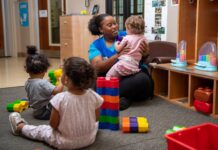Anxiety disorder is one of the prevalent mental illnesses in the United States, affecting 40 million adults. That’s 18 percent of the whole populace. And what’s even more alarming is that these numbers continue to rise. Anxiety disorders can affect anyone at any age, but they often start during childhood or adolescence. So, if you have an anxious child, don’t worry – you are not alone. You can use many strategies to help your child feel better and live a normal life. Here is a look at five of the most effective:
1. Encourage Your Child to Face Their Fears
Some of the great things one can do for an anxious child is to encourage them to face their fears. This may seem counterintuitive, but it’s one of the most effective treatment strategies. Facing and overcoming fears helps children build confidence and learn to handle difficult situations. It also helps them to understand that their anxiety is not rational and that they can control it. A good way to encourage your child to face their fear is to use exposure therapy. This type of cognitive-behavioral therapy involves gradually exposing children to the things they are afraid of. Exposure therapy allows children to confront their fears in a safe and controlled environment.
2. Teach Your Child Relaxation Techniques
Another great way to help anxious children is to teach them relaxation techniques. Relaxation techniques are a form of self-care that can help to reduce stress and anxiety. Also, they can enhance sleep, concentration, and overall well-being. The children’s most effective relaxation techniques include deep breathing, progressive muscle relaxation, and visualization. When teaching relaxation techniques to children, it’s important to make them fun and interactive. This will help to keep your child engaged and motivated. Also, practice the techniques yourself, so your child can see that you’re doing them too.
3. Help Your Child to Develop Healthy Coping Skills
Anxiety can be incredibly overwhelming for children. It’s important to help them develop healthy coping skills to handle their anxiety positively. Also, healthy coping skills can help to prevent anxiety from getting worse. Some of the children’s best coping skills include journaling, exercising, and talking to a trusted adult. Also, it is important to teach children that it is okay to feel anxious. Help them understand that everyone sometimes feels anxiety and that it is nothing to be ashamed of.
4. Validate Their Feelings
Whenever your kid is anxious, it’s important to validate their feelings. This means you should listen to them and acknowledge their feelings. For example, you might say, “I can see that you’re feeling anxious right now. It’s okay to feel that way.” Validation can help children to feel heard and understood. It can also help reduce their anxiety because they know you’re not judging them. Other phrases like “I’m here for you” and “I’m listening” can also be helpful. Don’t let your child bottle up their feelings – encourage them to talk about what’s happening.
5. Learn to Distinguish Between False and Real alarms
Lastly, another key thing you can do for anxious children is to help them learn to distinguish between false and real alarms. As a guardian, you can teach them about the different types of anxiety and how to identify when their anxiety is warranted. It’s also important to help them understand that sometimes their anxiety may be caused by something that is not dangerous. For example, if your child is afraid of the dark, you can help them understand that there is nothing to be scared of. Likewise, there are no monsters in the closet – only clothes! Helping kids with anxiety understand this can be incredibly helpful.
Do not forget always to tackle negative thoughts. A lot of times, children’s anxiety is caused by negative thinking. Help your child to identify their negative thoughts and challenge them. For example, if your child is afraid of going to school because they think everyone will make fun of them, help them to come up with evidence that this is not true. Maybe they have a best friend at school who always sticks up for them. Or, perhaps they are good at something that other kids are not. Helping children identify their positive qualities can be very helpful in reducing anxiety.
Conclusion
Anxiety is a normal and common emotion that everyone feels at times. However, for some children, anxiety can be very overwhelming and disabling. If your child is struggling with anxiety, there are many measures you can adopt to help. First, talk to your child’s doctor if you’re concerned. They can provide you with more information and resources.















